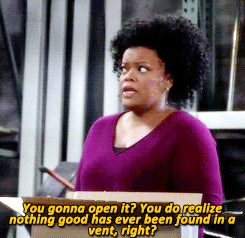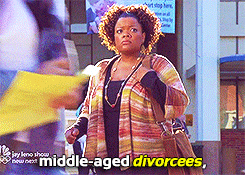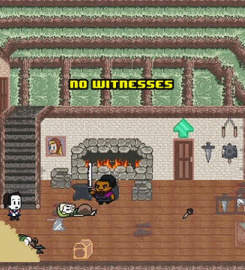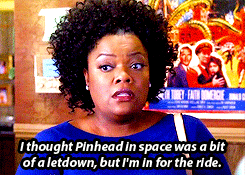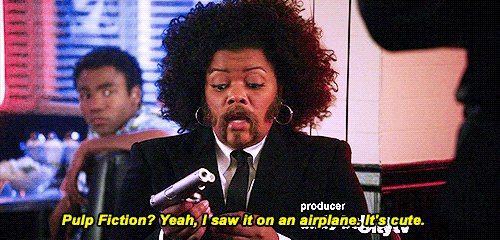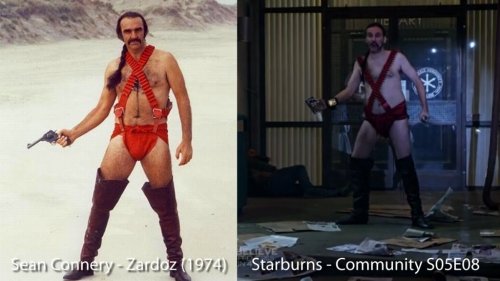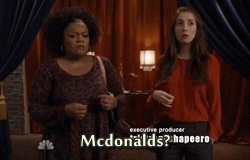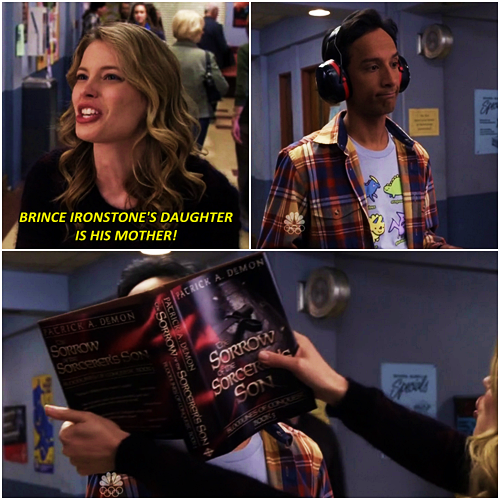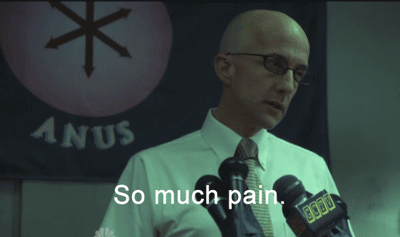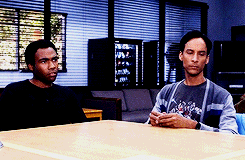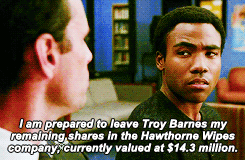This post contains spoilers for episode 5.09 of Community, “VCR Maintenance and Educational Publishing.”
This post was going to be about something very different, and then I realized: What I was going to respond to wasn’t actually the important part of this episode. It was simply a distraction from the real point. But I’m getting ahead of myself.
This week’s episode featured the return of Brie Larson as Abed’s sometime girlfriend Rachel, as well a sort-of cameo by Breaking Bad producer Vince Gilligan. Both were part of a storyline in which Annie and Abed argued over who should move in with them: His girlfriend or Annie’s brother, Anthony.
The concurrent storyline involved Jeff, Shirley, and Professor Hickey discovering a cache of mint-condition chemistry textbooks in a storage room while organizing (another item from the Save Greendale Committee’s task list).
They decide to sell the textbooks themselves, rather than turn the books over to Dean Pelton. Britta is brought in for the use of her shady connections to find a buyer, and then Chang stumbles into the middle of the plot. Jeff, Shirley, and Hickey turn on each other, and Shirley meets with Britta’s buyer (musician and songwriter Paul Williams in a surprise cameo) in a dark hallway. But their hopes of making a quick buck are ultimately disappointed, when the mystery buyer tells Shirley the books are misprints – each volume is missing page 105 – and no one will buy the books.
As wonderfully executed as Gilligan’s cameo was – especially the tongue-in-cheek tag including a second surprise appearance, with Gina Gershon appearing as his wife – people seemed frustrated by the inclusion of Annie’s brother for two reasons: The character was grievously underserved by the writing, and there had never been a single hint Annie was anything other than an only child.
Compounded by the fact that Anthony’s character was a fantastic opportunity to shed further light on Annie’s character and backstory – whether by discovering a new facet of her personality or find a clearer reason for an existing trait – yet we ultimately learned very little that was new about her, I personally wonder why the writers believed introducing a sibling with no prior warning would make for a compelling story element.
However, if nothing else, the missed opportunity to shed light on a main character and the secret textbook sale storyline did highlight something I hadn’t noticed about Community. As much as Jeff has always essentially been the main character – largely because the show was designed as a vehicle for Joel McHale, with the established star-power of Chevy Chase – he is not the true main character.
Let’s take a quick tally of which family members we’ve met and when:
- Troy’s grandmother (1.18)
- Annie’s brother (5.09)
- Abed’s father (1.03) and mother, sort of (2.11)
- Chang’s wife (1.10) and brother (1.18)
- Jeff’s father and half-brother (4.05)
- Pierce’s ex-stepdaughter (1.18), father (3.2) and half-brother (3.20)
- Shirley’s older sons (1.18), her husband (2.12), her baby (2.22), and a several members of her extended family (4.05)
While we’ve met none (Britta or Dean Pelton) or very few (see above) of the people close to most of our main ensemble, we’ve met all of Shirley’s immediate and some of her extended family. We knew much of her family had chosen her husband over her, and we’ve seen her gain and lose real and chosen family members (her youngest son, and her friend and business partner, respectively).
We’ve watched her journey from isolated single mother to successful businesswoman and watched her fall from grace, again, with the start of this season. We’ve watched her fall in lust (guy with dreadlocks), fall back in love with her ex-husband, and have a random one night stand (albeit with dubious consent). We knew more truth about her from day one than any of the other characters: Her husband left her for a stripper, she had two young children, and she wanted to sell her brownies and such on the Internet. We knew she was angry over the hand she’d been dealt, and her decision to attend Greendale was driven by a desire to take back control over her life.
We learned over time that she had anger management issues, that she was essentially a recovering alcoholic, and, as she herself mentioned earlier this season, that she has a problem with passive aggressiveness. Where the other characters have willfully withheld or unconsciously omitted important information about themselves, Shirley has always stuck as much to the truth as possible – even if she can and does manipulate others to advance her own cause.
If we assume, despite Community‘s creativity and rejection of traditional sitcom tropes, that one character is the audience’s point of entry and that character is our main character, the true focus of the show is Shirley Bennett, a Black single mother and small business owner with expanding interests.

It’s difficult not to want good things for Shirley, especially when she typically only works to improve herself and others. She’s had so many disappointments, and yet she is unflinchingly optimistic.
When her husband leaves her, she turns it into an opportunity to become self-sufficient. When she is kicked out of her first study group, she takes offense at their nickname for her but doesn’t lash out at them directly. When she discovers she’s pregnant, she is worried that her child’s father might be Chang, but she doesn’t keep him at arm’s length (more so than normal, at least). And when Greendale denies her the opportunity to open her own business, she refuses to accept their answer as final.
In a society and a time when women are expected to always be polite; to never raise their voice; to immediately apologize for any offense, real or imagined; to not expect their opinions to be valued unless they further those of a man; to stand down when they are told their behavior is somehow inappropriate; and to not only express shame, but to genuinely feel shame when society tells them they are not behaving like a woman, Shirley is a role model.
Shirley is not perfect. She is not always quiet. She often yells and shouts. She is occasionally violent.
She appreciates the value of revenge. She stands by her opinions, even when they are unpopular. She shows embarrassment, but she is rarely ashamed of her choices.
She appreciates a pretty face on a man, and isn’t shy about saying so. She shows a true mercenary streak, as demonstrated when she ties up her would-be partners so she can pocket the entire windfall from the chemistry textbooks.
She is polite, but she will not be cowed. She loves her children and her friends, and she fights for them. She is willing to forgive the man who betrayed her sacred trust and give him another chance.
She asserts the worth of others, even when they don’t value themselves. She is unfailingly honest, but she has the maturity to acknowledge if she’s hurt someone because they misunderstood her.
Shirley is wiser and tougher and stronger than many female characters on TV today.
She never says ‘quit,’ and she does so, mostly, with good humor and the wisdom of experience. She is the true main character of Community, and as nice as it would be for her to catch a break – Maybe Idris Elba is a deacon at her church? Or Chris Evans is an investor for Shirley’s Sandwiches? Perhaps Godfrey Gao is a different investor, who wants to open a chain of Shirley’s Sandwiches in Canada? – she never seems to ask for more than the love of her family and the loyalty of her friends.
She’s not the obvious star because she doesn’t expect to be treated with kid gloves: Shirley understands that being an adult means not only opening yourself up to criticism but learning to respond to it gracefully.
As a friend of mine said last night, it’d be nice to learn even more about Shirley’s background than we already know. But, in the meantime, I would have settled for her plan to sell the textbooks not backfiring, and Shirley making out like an outlaw bandit.

